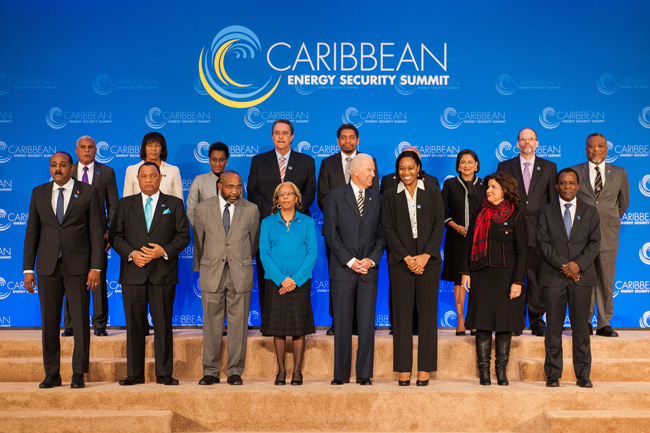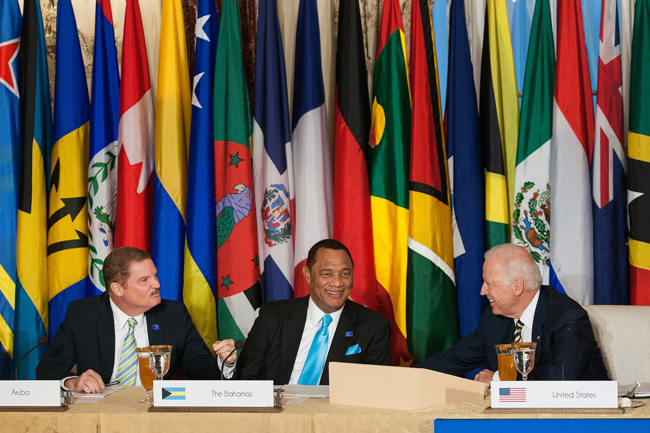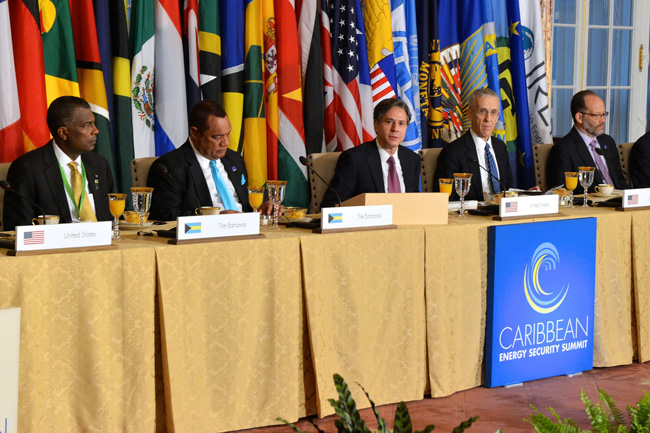
US Vice President Joe Biden, center, joins other world leaders, including Prime Minister of the Commonwealth of The Bahamas, the Rt Hon Perry G. Christie for a group photo during the Caribbean Energy Security Summit at the U.S. Department of State in Washington, D.C. on January 26, 2015. [US State Department photo]
|
WASHINGTON - In follow-up to the launch of the Caribbean Energy Security Initiative
(CESI) in June 2014, the Vice President, Secretary of Energy Moniz,
other senior Administration officials, Caribbean Heads of Government,
multilateral development banks, and other international partners
participated in the Caribbean Energy Security Summit January 26 in
Washington, D.C. to work together in support of Caribbean energy
security.
The Summit highlighted ongoing efforts under the CESI,
including support for improved governance, enhanced access to finance,
and increased donor coordination. Caribbean leaders highlighted goals
for their energy sectors and discussed how the United States and other
partners can better support the Caribbean in pursuit of alternative
sources of energy. Caribbean leaders agreed to pursue comprehensive
energy diversification programs, including actions to facilitate the
introduction of cleaner forms of energy.
The World Bank presented a proposal to create a Caribbean Energy
Investment Network to improve coordination and communication among
development partners and to empower Caribbean nations to direct and
align external support with their own national goals. Governments and
multilateral development partners welcomed the proposal as an initial
step to a build upon existing efforts to improve the effectiveness of
donor-supported energy programs.
At the Summit, cohosted by the Department of State, the Council of
the Americas, and the Atlantic Council, partner countries discussed
comprehensive energy diversification strategies, such as the
U.S.-Grenada pilot program that was launched in September, following the
signing of a Memorandum of Understanding between the two countries on
August 27, 2014. This program is based on a model that was successfully
implemented in the U.S. Virgin Islands (USVI) and Hawaii and that seeks
to identify tailored, comprehensive energy solutions for island
jurisdictions.
The United States’ Overseas Private Investment Corporation (OPIC)
will intensify its focus on developing clean energy projects in the
Caribbean. OPIC and the Department of State have identified a team with
specific responsibility for identifying and arranging financing for
Caribbean projects. OPIC announced January 26 it will disburse the first
tranche of approximately $43 million in financing for Blue Mountain
Renewables’ 34 MW wind project in Jamaica.When construction begins in
June, this project will be a tangible example ofpublic and private
sectors in both countries working in harmony—and nearly $90 million of
investment in Jamaica’s economy, which also will ease Jamaica’s
dependence on fossil fuels.

Vice President Joe Biden speaks with Prime Minister Perry Christie of The Bahamas and Prime Minister Michiel G. Eman of Aruba as they attend a multilateral meeting with leaders at the Caribbean Energy Security Summit at the U.S. Department of State in Washington, D.C. on January 26, 2015. [Photo: US State Department ]
|
Additional U.S. Assistance to Promote a Cleaner more Secure Energy Future in the Caribbean:
The U.S. government continues to deepen its technical assistance and
capacity building programs to the Caribbean under the Energy and Climate
Partnership of the Americas (ECPA) initiative and other mechanisms:
Improving Governance: The U.S. Department
of State is supporting technical assistance in Saint Kitts and Nevis to
support development of their geothermal resources. Work includes
competitive procurement processes, electrical system analysis,
environmental review, project management, and technical and commercial
island interconnection studies. Under the Haiti Energy Policy and
Utility Partnership Program, funded by USAID, the U.S. Energy
Association is supporting power sector reform in El Salvador, Haiti, and
the Dominican Republic.
Facilitating Development of Cleaner Energy Sources: Through
the Department of State-funded Caribbean Sustainable Energy Capacity
Building Project, the Organization of American States (OAS) is providing
project development support to Caribbean governments and utilities for
sustainable energy projects. The U.S. Department of Interior, together
with State, is working with Jamaica to facilitate commercial renewable
energy on public lands. The U.S. Agency for International Development
(USAID)’s Improved Cooking Technology Project in Haiti resulted in more
than 50,000 biomass and LPG stoves sold to reduce charcoal use and is
encouraging the widespread adoption of this technology. The OAS, with
Department of State funding, is assisting Trinidad and Tobago in the
Closed Loop Cycle Production project to promote cleaner production
methods among small businesses.
Developing Collaborative Networks on Clean Energy:
The Department of Energy, in partnership with the Government of the
United States Virgin Islands and Caribbean-Central American Action, will
host the Caribbean Clean Energy Technology Symposium March 24-27, 2015
in St. Thomas, USVI. The Symposium will be the first in a series of
regional stakeholder engagements to formulate concrete goals, sharing
best practices, and addressing implementation strategies for clean
energy adoption.Working Groups will create networks to address
Caribbean clean energy issues, including energy education, efficiency,
renewable energy and electricity diversification, and climate change.
Based on the USVI experience, the U.S. Department of Energy (DOE) will
publish an
Energy Transition: Islands Playbook that will
facilitate the implementation of CESI elements in a specific island
setting with a focus on improving energy security, boosting economic
growth, and advancing environmental sustainability across the region.

Deputy Secretary of State Antony Blinken hosts a Climate Change working breakfast during the Caribbean Energy Security Summit at the U.S. Department of State in Washington, D.C., on January 26, 2015. [US State Department photo]
|
Financing Clean Energy Projects:USAID will
support a multi-year regional Caribbean program to promote energy
efficiency and integration of renewables into island energy grids. The
Jamaica Clean Energy Program, which will be the largest portion of the
overall effort, aims to establish the pre-conditions for clean energy
development, optimize renewable energy integration, and accelerate
private-sector clean energy investment.In the Eastern Caribbean,
USAID’s support will emphasize the development of new financial tools
for energy efficiency and renewables with a particular focus on the
hotel and tourism sectors.
The U.S. Trade and Development Agency has provided grant funding for
three projects in the Dominican Republic that will support the
development of clean energy: a feasibility study and pilot project to
assess the viability of modular electric generators, technical
assistance to analyze new smart grid options and technologies for
improving system reliability, and technical assistance to develop
financial tools for commercial users to acquire solar photovoltaic power
systems for self-generation.
Increasing Energy Efficiency: DOE, OPIC,
and the Pacific Northwest National Laboratory are developing the
Caribbean Hotel Energy Efficiency and Renewables (CHEER) Program.CHEER
will provide technical assistance, training, and attractive financing to
hotels that commit to reduce their energy and water footprints through
efficiency and renewable technology solutions. Through the Department of
State’s Sustainable Communities in the Caribbean and Central America
project, the OAS is promoting clean energy and efficiency in Antigua and
Barbuda and the Dominican Republic.
Expanding Access to Electricity, Information and Technology:USAID
is working to rehabilitate a 4MW power plant in Northern Haiti. The
Peace Corps, together with the Department of State, is increasing access
to environmentally friendly energy technologies as well as educating
communities on conservation, climate mitigation, and adaptation, in
countries where it is present.DOE is providing technical support to the
Trinidad and Tobago Ministry of Energy and Energy Affairs to design and
carry out a Caribbean-wide Regional Energy Research Center.The
Department of State, through the OAS, is catalyzing regional technical
cooperation on renewable energy, air quality and greenhouse gas
measurements through the Inter-American Metrology System.
SOURCE
